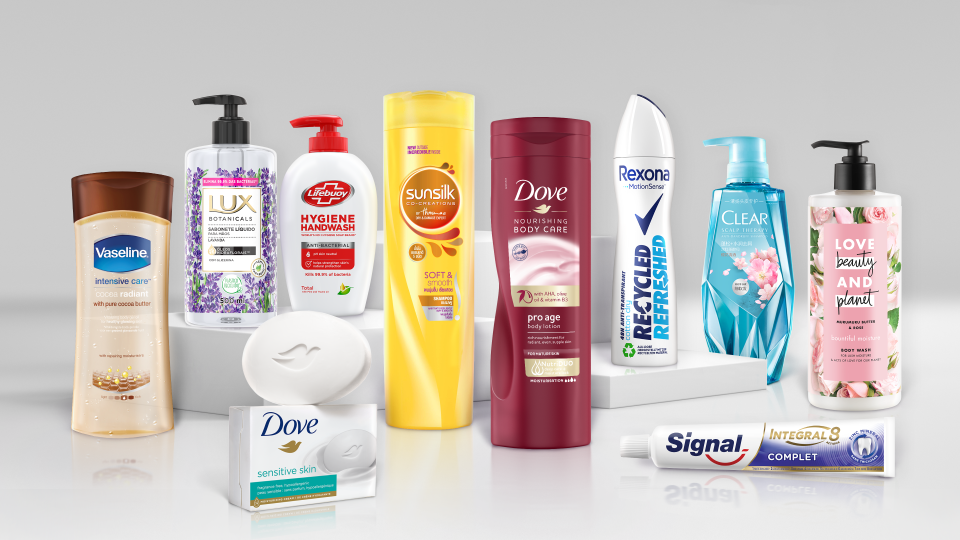Unilever Skincare, Prestige Beauty Sales See Robust Growth in First Half

LONDON — The reopening of makeup and beauty stores as lockdowns eased helped to bolster Unilever’s overall sales in the first half of the year, with skincare and prestige beauty both growing in the double digits during the six months to June 30.
Unilever said in a first-half update on Thursday that sales were up 5.4 percent on an underlying basis to 25.8 billion euros. On a reported basis, they were broadly flat, edging up 0.3 percent, dented mostly by currency fluctuations.
More from WWD
Underlying sales in the second quarter were up 5 percent to 13.5 billion euros, and rose 1.2 percent on a reported basis.
Net profit in the first half declined 4.1 percent to 3.39 billion pounds, which the company said was due to investment and input cost inflation due to an increase in raw material, packaging and distribution costs globally.
Shares in Unilever closed down 5.9 percent at 40.51 pounds on Thursday.
Chief executive officer Alan Jope described the first-half performance as “strong,” with the underlying sales growth of 5.4 percent “driven by our continued focus on operational excellence.”

He said the company was making “good progress” against the strategic choices it outlined earlier this year, including the development of its portfolio into high-growth spaces, such as prestige beauty.
He added that sales of prestige beauty and functional nutrition products grew strongly, and added that the spin-off of Unilever’s tea business is “substantially complete.”
Unilever has said it will part ways with the tea business via an initial public offering, sale or partnership.
Jope added that Unilever was still exploring its options for the new Elida Beauty group. Earlier this year, Unilever had bundled together nonstrategic personal care brands including Q-Tips, Caress, Tigi, Timotei, Impulse and Monsavon, and is looking to “maximize value creation” of the group, which had combined revenues of around 600 million euros in 2020.
Unilever’s e-commerce business grew 50 percent in the first six months of the year, and the channel now represents 11 percent of sales, the company said.
Competitive growth remains Unilever’s priority, and the company said it’s confident it can deliver underlying sales growth in 2021 “well within” its multiyear framework of 3 to 5 percent, and despite difficult comparisons in the second half of the year.
Unilever will be benchmarking second-half growth against a surge in sales in some divisions from COVID-19 restrictions last year.
The company added that the operating environment across its markets remains “volatile,” with restrictions on daily life continuing around the world, “impacting channel dynamics, sales mix and consumer behavior.”
In the Beauty and Personal Care division, underlying sales grew 3.3 percent to 10.4 billion euros in the first half, with an acceleration to 4.2 percent growth in the second quarter. Unilever said the acceleration came from an increase in personal care consumption “as living restrictions were eased in some of our markets.”

Image Courtesy of Unilever
In the half, skin care grew in the double digits and deodorants returned to growth, as people began returning to work and socializing. In skin care, the Vaseline and Ponds brands each saw double-digit growth.
Skin cleansing declined as the company faced tough comparisons with last year, when it witnessed a sharp increase in demand due to the onset of COVID-19. Unilever noted that the premium brand Shea Moisture grew in the double digits in the U.S. in the first half.
The prestige beauty brands grew in the double digits, due to higher in-store footfall. As reported in June, Unilever acquired the digital-led skin care brand Paula’s Choice, calling it a pioneer in jargon-free science, high-performing ingredients and cruelty-free products.
Some analysts were puzzled by the drop in the share price.
“That’s the opposite of the positive reaction we have been expecting,” wrote Pierre Tegner, who covers food and spirits for Oddo Securities, pointing to the underlying sales growth in the first half.
“All in all we see the market reaction as an overreaction, having in mind the H1 beat, and guidance not leading to a consensus cut. Qualitatively, this market reaction can be explained by the high level of investors’ sensitivity regarding (price) inflation.”
Earlier on Thursday, Tegner had predicted that the share price would rise due to good organic growth in both the first half and the second quarter, and management’s confirmation of the organic growth guidance for 2021 of 3-5 percent.
The company also addressed the decision by Ben & Jerry’s to end sales of its ice creams in the Occupied Palestinian Territory.
“We believe it is inconsistent with our values for Ben & Jerry’s ice cream to be sold in the OPT. We also hear and recognize the concerns shared with us by our fans and trusted partners,” the company said earlier this week. “Although Ben & Jerry’s will no longer be sold in the OPT, we will stay in Israel through a different arrangement. We will share an update on this as soon as we’re ready.”
Unilever management said Thursday that it was aware of the decision made by the independent board of Ben & Jerry’s, that the company’s decision did not come as a surprise and that Unilever remains “fully committed” to selling its products in Israel.
Sign up for WWD's Newsletter. For the latest news, follow us on Twitter, Facebook, and Instagram.
